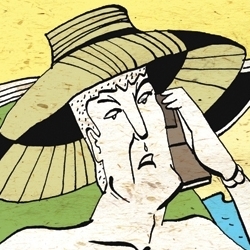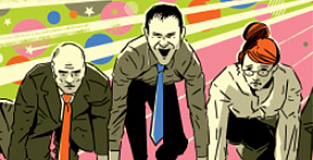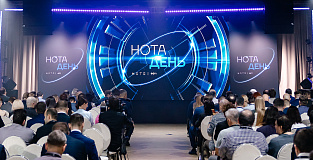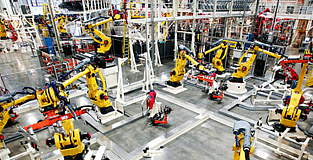
читайте также
- Well, is it true that Nikolai Petrovich returns? – asked Ivan, the personal driver of the founder and the CEO of the ‘Wight’ conglomerate, looking with hopes at Lenochka, who was a secretary. – Won’t I finally get a job?
Ivan had already been going to the office for about two years as if it was an Internet club. Nikolai Petrovich Paltusov, Ivan’s ‘owner’, was rarely seen in St. Pete, that is why Ivan, as Lenochka said enviously, kicked his heels almost all his working hours. Being an old school man, he suffered from the fact that he got money for nothing, therefore he was ready to apply himself to various orders of ‘Wight’s’ managers and ordinary employees. All the remaining time he spent at the computer – generally on forums, which were dedicated to the off-road racing ‘Ladoga – Trofi’.
- Yes, - Lenochka sighed deeply, - he returns. I don’t understand what you are glad for: I have a feeling that everything will go from bad to worse with his arrival.
- Drop it, - Ivan objected. – You simply don’t know him. Nikolai Petrovich is as wise as Solomon! He will resque all of us.
- Oh, it’s doubtful, - Lenochka shaked her head. – He’ll destroy us. You know I’m so worried about my position! What if he cuts down the number of staff – where should I look for a job during the crisis?!
- Don’t worry, Lenok, - Ivan winked. – Everything’s going to be all right.
The Journey to a Dream
Nikolai Petrovich Paltusov was really fond of Great Britain for all his life. ‘One day’ – he said in his youth, - ‘when I become rich and famous, I’ll buy a cottage on the Isle of Wight and will live there to my heart’s content’. In order to realize this dream he did the first step at the beginning of his career – he named his company for the future residence and depicted a rhombus on its logotype – the same as on the island’s flag.
His first business was real estate development. Using contacts with the regional government, he acquired profitable building plots, invested in engineering infrastructure, arranged all the documentation and offered these lots for sale at a price, which exceeded expenses in several times. Many plots required major drainage works and Paltusov began to purchase pumps from the well-known European manufacturer Norgefos. Thereby, he got the second business. Then he held back two plots, which had been obtained exceptionally cheap and put them in motion – the first one was determined to become a logistic terminal, the second one was advantageously exchanged for an automobile dealership, selling second-hand cars.
Having got his businesses going, Paltusov finally decided: it’s time to relax. He found a nice house on the island of Wight – in a small town which was situated on the seashore, arranged last formalities and left his motherland for an indefinite term. He passed the helm of state to the chief operating officer, Leonid Krasheninnikov, who had 15% of shares. Confident that his company was in good hands, Paltusov almost ceased to be interested in its affairs (he was receiving regular dividends and the reports were fine) and plunged into a new carefree life.
The Conflict of Strategies
- I think there is no sense in your coming now. – Krasheninnikov tried to speak calmly, but his voice betrayed his excitement.
- There is no sense? – astonished Paltusov repeated. – You believe at this time I have to sit on the beach and admire sunsets? This situation is difficult for me, the investments have been depreciated, the share in the English brokerage receded. I can’t allow ‘Wight’ to go to the bottom – and it’s apparently real. I can even see that incomings barely cover operating expenses.
- Nikolai Petrovich, you are exaggerating. The real threat doesn’t exist. Now everybody has a hard time. The circumstances have changed and we can’t do anything about it. Well, people don’t start working worse.
- Do I look like an idiot? – Paltusov exploded. – You consider I don’t understand that the situation has changed? To put the blame on the circumstances – it’s the very limit! Your ability to keep calm when everything is on fire, no, when everything’s blazing, is tremendous.
- The one’s blazing who has lots of depts. Moreover, it isn’t clear who he owes to and when he will be able to pay. We have very modest capital leverage. The inventory loan from Norgefos is in the warehouse. If there is a trouble, we can return it at any moment. The cars have always been purchased after the preliminary payment. The construction project has been stopped. There are several problems with banks but we’ve almost agreed on the basic restructing of the debt. So, everything is under control. The main thing now is to avoid rash actions. The crisis will end some day and everything will be better…
- What does it mean ‘will be better’? We must regulate the situation by ourselves. Maybe, it’s not as bad as it seems from afar. I will arrive and sort it out. It’s not my single goal. The company should not be only saved now – it should be developed!
- Nikolai Petrovich, what are you talking about? – Krasheninnikov couldn’t believe his ears. – To develop? In this crisis time?
- Yes, it is just what I said! The crisis is the right time for …
- But, wait a minute, - Krasheninnikov interrupted him. – It’s out of the question. Our main goal is to keep the margin at the same level. We reduce expenses and curtail new directions. Well, for example, our disposals have dropped by 30%, it means, that our expenses must be reduced by 50%.
- You know, Leonid, using the exact figures for the whole company is a definitely correct way, but it’s necessary to find a more fragmented approach. We have some business units – Paltusov started to embellish his speech with English terms not long ago – which are naturally overloaded. I will come and we’ll together examine the situation: maybe it is worth to sell something out in order to replenish the operating capital and to enhance something that will rise in price in the future.
- And what will rise in price in the future? Do you actually know?
- Several sectors of economic activity are already showing some growth… - Paltusov thought for a moment. – Let’s say we trade cars – well, maybe the hell with it? Anyway it’s a kind of a hobby or something like that. Maybe we should stop it? And vice versa, at the time when all the sales have dropped, we should occupy a pair of new plots. Demand will start to recover and we’ll turn out to be in the forefront of the industry’s grows. It’s not a guide for action, it’s rather some first outlines. I’m just thinking out loud. I repeat again: I’ll come and we’ll sort everything out.
Having understood the impossibility to bring Paltusov over and the fact that he’d dart off and rush to reorganize the company, Krasheninnikov lost his spirits. The strategy, which was promoted by the CEO, seemed to be not only fallacious – even inept. Well, it was not the single reason. There was one more circumstance which made the CEO’s arrival extremely undesirable: Leonid and Nikolai Petrovich belonged to different eras, held different styles and management techniques.
Paltusov was a ‘strict but fair’ lord. He could punish and pat on the back at the same time. He could grind somebody into dust, humiliate and shout at, and then he could forgive everything, take to his bosom, ‘make you join his hunting’. Krasheninnikov, a man of a post Soviet formation, kept everybody at the same distance. His management principles were crystal-clear for all the staff. He promoted and rewarded competent employees and stimulated the zeal of poor performing members. Everything became quite predictable and started to function well.
In conditions of instability, emotional tensions, uncertainty about the future, such difference of approaches could destabilize the staff, to sow discord and dissension in the process of work. Krasheninnikov was sure that employees, who he had selected, would take their part with him, and the old guard, who firmly believed in the omnipotent ‘lord and master’, would support Paltusov; also there would be a group of employees who would act according to the principle ‘to be all things to all men’. Obviously it would provoke gossips and conflicts. The atmosphere would be messed up, the team spirit would disappear. So, the company with the broken corporate culture would pine away as a man with a weakened immunity system, and wouldn’t survive in the crisis.
- Nikolai Petrovich! – There was a dying hope in Krasheninnikov’s voice. – I honestly think that it’s not the best time for changes. Let’s wait a little bit. We have to hold out till the situation will be improved, so then we’ll rise with the market. When the crisis is over, everything will resume its normal course.
- Listen to me, young man! I have a long life; I’ve seen lots of things. You’ve said ‘we’ll rise with the market’, but when the crisis is over everything will be changed. The market won’t be the same as it has been previously, that is why we have to pursue a preemptive tactic, to map out some new points of increase. Now it’s possible to lay the groundwork for the future: those who have a hard time, are ready to sell themselves for a song.
- But we don’t need to fish in troubled waters… - Krasheninnikov objected weakly.
- If we follow your strategy and lie to the strategic drift then we’ll roll far away, - Paltusov parried. – In short, I’ll arrive on Saturday. The evening fight of British Airways. Let Ivan come to meet me.
To hide or…
In order to relax after this unpleasant conversation, Krasheninnikov went out into a corridor. There was a sudden silence in the office. He glanced at his watch: it was 20:40. Duh, the staff had already gone. Having poured a cup of tea, Krasheninnikov sat down to table in the empty kitchen.
‘It looks like Nikolai Petrovich is out of touch with reality at all, - he thought. – Well, it is clear: perhaps he doesn’t see from a distant island what is going on in his native land? The worst thing is that Paltusov seems to look like a tank: he barges forward, nothing can stop him. Soon he’ll come and display his rapid activity. He will catch the tail-wind, splash his enormous energy’.
Having sipped his coffee, Krasheninnikov frowned: too much sugar. Perhaps he was deep in thoughts and didn’t even notice some extra spoons.
‘Let’s think logically, - he tried to collect his thoughts. – What can Paltusov invent? Would he decide to sell the logistic terminal – unfinished construction project? How could he contrive to sell it? What to do with the money? Should we extinguish cash deficiency? Should we search for the attractive reinvestment objects? Should we purchase the businesses that ‘Wight’ has never dealt with? Should we dissipate our power to negotiations instead of being busy with the current efficiency?! Our own logistic terminal is still a dream! We built it with great love and pleasure, avoiding the rush. ‘Wight’ is the customer and the real estate developer. ‘Wight’ is the general designer and the general contractor. And if we sell it, what will we do with the project office? Here work the Experts in every sense of the word…
What if he suddenly decides to abandon the car business? He will certainly do – it has always been a kind of a toy for him. He’ll sell it with a light heart: we received lots of purchasing offers even two month ago in the hardest time.
Immersed in his heavy thoughts, Krasheninnikov didn’t hear the phone call: his mobile phone vibrated in his pocket and lapsed into silence with some disappointment.
‘Probably I have a chance to preserve all our companies. – Krasheninnikov thought with a hope. – I’m almost sure that I will be able to tilt the balance in my favor by cooperating with some members of the court of directors. We’ll knock together a coalition and hold the line. We’ll take a council and reconcile several scenarios in order to choose the most pessimistic one. We’ll keep a low profile and adhere to the minimum level of expenditures. We’ll save the key-experts. We’ll finish the logistic terminal by all means and incorporate it in an international logistic chain. This is where Nikolai Petrovich’s new connections will come in handy. When the crisis is over we will think what we should do next: to focus on one area or to develop all the directions.
Suddenly Krasheninnikov fell silent. The thought struck him: what if Paltusov is right at some points and his theory has a core of sense?
‘Probably, I don’t understand anything? I’ve never work under the conditions of instability. The one thing is to lead the company when everybody is satisfied; the other thing is to lead, realizing that tomorrow you won’t be able to pay salaries. Nikolay Petrovich is a very intelligent, experienced man. He feels that there is a large sum of money somewhere near…’ ‘But where are the money?! – Krasheninnikov objected to himself, - We can’t rely on the state support: our business is not socially significant. Certainly, Paltusov may have something to beg from the city government, but this step will tie our hands – we‘ll depend again on officials.’
The inner dialogue pulled Krasheninnikov off balance. It seemed that it was a battle of two different men: the first one was sure in his rightness; the second one was diffident and had doubts.
‘And maybe we should sell something? These three businesses pull us in different directions as a swan, a cancer and a pike in a famous Russian fable. If we knew that everything would run into troubles… Each business had its own standards and strategies. The risks were carried on three branches. The car business was profitable and branding one. The trading house sold the pumps. There was also a small candle factory. It dripped drop by drop. We had a well-qualified staff. We worked without failures. Real estate development was a more serious direction, but its prospects became vague a year ago. All the tidbits were taken many times ago. And we never worked over the counter…’
Krasheninnikov did not know what to think. The survival strategy seemed to be more appropriate; he was sure that after the crisis the market would be the same. But his inner voice persuaded him in the partial rightness of Nikolai Petrovich, because he was too persistent.
Going only forward?
Nicolai Petrovich Paltusov went to Moscow with a heavy heart. The conversation with Krasheninnikov left an unpleasant aftertaste in his soul. For all these years living abroad he had been observing the company’s development and considered Leonid to be intelligent and reliable man. Paltusov praised himself many times for the choice of the chief operating officer and was very proud of the fact that he was able to discern some leadership inclinations. He felt that they breathed the same air and reacted to everything quite equally. But it turned out that they had different opinions about the future of the company
‘Well, it doesn’t matter’ – Paltusov tried to reassure himself. – I’ll sort everything out and make a decision. Certainly we’ll have to refuse something. The first knockout candidate is the unfinished terminal. Now the construction project is stopped, but still it requires lots of money: security, taxes, winter heating, and prevention of all systems. If we don’t sell the terminal in the near future, we should finish it as soon as possible otherwise the state committee won’t sign our acts. But we have no money for this project. The second variant is the automobile dealership. Here we’ll get a large sum of money – the first part will be dedicated to the extinction of the operating dept, the second will be invested in pump business development. We’ll open several trading houses in Novgorod, Pskov, Cherepovets. We’ll outbid the best vendors, now it’s not a problem – there is a ‘first in first out’ in the labor-market. The employer dictates his rule. Step by step we win the first place in the regions, and the remaining means helps us to buy a new business – at a giveaway price of a broken proprietor.
Suddenly Paltusov imagined the resistance which he will face in implementing the plan. Certainly, he will have his adherents – it is obvious, but he will get lots of opponents: probably Krasheninnikov has already carried out an agitation campaign.
‘How can I have such a one-sided view? – Paltusov got worked out again. – ‘How can I be so narrow-minded? I’m sure that Krasheninnikov take care for the company too. What’s the matter then? Doesn’t he understand that the crisis is the time to take the bull by the horns? Or maybe he just knows something that I don’t? But what? Paltusov closed his eyes and immersed into deep thoughts. The plane started the landing…
What strategy should the company hold and what would you do in this situation?








